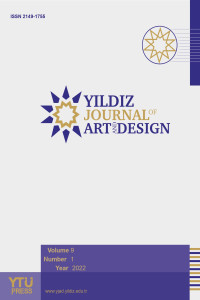İSTANBUL’DA KONUTU DUYUMSAMAK: NEFES ALABİLEN EV
Bu makale Sefaköy’de gerçekleştirilen deneysel bir sanat projesi çerçevesinde Türkiye’deki konut kurumlarının “güç” olgusuna dayanarak konuta yaklaşımların ve konut politikalarının etkilerine odaklanmaktadır. Sanat projesinin süreci; rol paylaşımı aracılığıyla araştırmacı ve ev sakinlerinin (dweller) zihninde açık bir diyaloğun nasıl oluşabileceği üzerine soru üreterek, otorite, gücün dağılımı ve tasarımcı ile ev sakini arasındaki etkileşimi anlamaya yönelir. Okkito adındaki sanat projesi; Türkiye’de toplu konut değerlendirme ve üretim sektörüne bağlı olarak, İstanbul’da kentsel dönüşüm altındaki alanlarda ev sakinlerinin algısını anlamayı amaçlar ve konut yönetimi odaklı üretim sektörünün genel olarak odaklandığı durumları aşarak ev sakinlerinin algısına müdahale eder. Konut; yalnızca tepeden inme planlama pratiklerinin çıktısı olan belirtiler aracılığıyla değil, aynı zamanda ev sakinlerinin ve planlamacıların eşzamanlı evrimleşen algıları aracılığıyla değerlendirilir. Yeni yollar ile potansiyeller yaratarak ve İstanbul’da konut bağlamında var olan mevcut ontolojiyi alaşağı ederek düşüncelerin şiirsel transferine olanak tanıyan deneysel proje ile, yaratılan konut algısının ev sakinlerinin planlamacılarla yana doğru bütünleşik hale geldiği, yeni düşünce ve potansiyelleri yansıttığı gözlemlenir.
Anahtar Kelimeler:
Konut, Sanat projesi, Yerleştirme, Sosyal pratik, Katılımcılık, Etkileşim, İstanbul
SENSING HOUSING IN ISTANBUL: A HOUSE THAT IS BREATHABLE
The article focuses on the effects of housing approaches and policies by negotiating the “power” of housing associations in Turkey through an experimental art project held in Sefaköy, İstanbul. The process of the project addressed questions of authority, the distribution of power, and understand designer-dweller interaction in housing by asking how an open dialogue could be developed in the researcher and dwelllers’ mind through role sharing.Based on mass housing evaluation and the construction sector in Turkey, the art project, Okkito aims at understanding the perception of dwellers in areas under transformation in İstanbul and transcending this in order to intervene in dwellers’ perception, which is generally focused on the housing administration-oriented housing production sector. Housing is evaluated not only through the manifestations of outcomes of top-down planning, but also through the simultaneous-evolving perception of dwellers and planners. By overthrowing the existing ontology in context of housing in İstanbul, opening new ways and potentialities and enabling a poetic transfer of ideas, it was observed that perception of housing mirrored emerging ideas and potentialities where dwellers were laterally embedded with those of planners.
Keywords:
Housing, Art Project, Installation, Social Practice, Participation, Interaction, Istanbul,
___
- Bourriaud, N. (2002). Relational Aesthetics. New York: Les Presses du reel.
- Broekema, H. & Kuipers, S. (2013). Failed policy, successful architecture: Self-made city Istanbul. Retrieved from http://failedarchitecture.com/failed-policy-successful-architecture-self-made-city-istanbul.
- Clapham, D. (2002). Housing Pathways: A Post Modern Analytical Framework. Housing, Theory and Society, 19(2), 57-68. Clapham focuses on the outcomes of the interaction with the household patterns and linguistic and societal construction of reality. This approach was later addressed by Manzi in terms of an imaginative approach in order to understand the cultural context and economic and political changes within housing issues and examine various experiences of housing and open up the neglected social status of housing (Manzi, 2005. “Fact and fiction in housing research: Utilizing the Creative Imagination”. Housing, Theory and Society 22(3),113-128. doi: 10.1080/14036090510011595.
- de Certeau, M. (1984). The Practice of Everyday Life. Berkeley: University of California Press.
- Deleuze, G. & Guattari, F. (1987). A Thousand Plateaus: Capitalism and Schizophrenia, translated by Brian Massumi. New York: University of Minnesota Press.
- Erkip, F. (2000). Global transformations versus local dynamics in Istanbul: Planning in a fragmented metropolis. Cities, Viewpoint 17(5), 371-377. doi: 10.1016/S0264-2751(00)00033-0.
- Hannula, M, Suoranta, J. & Vadén, T. (2005). Artistic research: Theories, methods and practices. Helsinki and Gothenburg: Academy of Fine Arts, Finland and University of Gothenburg. This research is distant from the "subject-object or observer-observed distinction" as a definition of experience. According to the authors, "experience in general is a continuum from the indistinct and flux-like torrent to the clear and precise structure of reasoning or controlled observation" (Hannula, Suoranta & Vadén, 2005: 43). Based on experience, artistic research is hermeneutic and produces a new experience with "questions of validity for the interpretation" (Hannula, Suoranta & Vadén, 2005: 44). Therefore, the artistic approach is "self-reflective, self-critical and an outwardly-directed communication" (Hannula, Suoranta & Vadén, 2005: 20).
- Jacobs, K. & Manzi, T. (2000). Evaluating the Social Constructionist Paradigm in Housing Research. Housing, Theory and Society, 17(1), 35-42. doi: 10.1080/140360900750044764.
- Keyder, Ç. (2005). Globalization and Social Exclusion in Istanbul. International Journal of Urban and Regional Researc, 29(1), 124-34. doi: 10.1111/j.1468-2427.2005.00574.x.
- King, P. (2009). Using Theory or Making Theory: Can there be Theories of Housing? Housing, Theory and Society, 26(1), 41-52. doi: 10.1080/14036090802704296.
- Manzi, T. (2005). Fact and fiction in housing research: Utilizing the Creative Imagination. Housing, Theory and Society, 22(3):113-128. doi: 10.1080/14036090510011595.
- Merriam Webster, 2017. Retrieved from https://www.merriam-webster.com/.
- The Author, Surname. Name. (2010). Okkito. Exhibition Book, Self published. The text is from a shortened version of a public speech given at a xxx Workshop in 2009.
- The Author, Surname. Name. (2011). PhD thesis. Okkito was realized as a part of transdisciplinary approach by the author. The author experimented with the transdisciplinary process by pretending to become multiple experts and actors in terms of Deleuze and Guattari’s terminology of schizophrenia. By becoming multiple personalities, the existence of experts from different disciplines participating in the transdisciplinary approach was approached with uncertainty. The parody in this sense was aimed not at acting against or overthrowing corporations, but rather at understanding this new methodology and underlining its difficulties in application. Thus, this need transforms our knowledge of housing. We need to handle this transformation due to the rising ambiguities and different forms of hybrid housing, such as mixed-use planning. Moreover, post-occupancy evaluation or user satisfaction research may be bordered within the single object as housing in a diverse urban space.
- Başlangıç: 2013
- Yayıncı: Yıldız Teknik Üniversitesi
